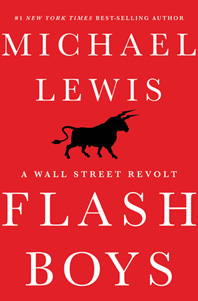This is a big week for Michael Lewis and fans of his work. First it was reported that his book The Big Short is going to be made into a feature film by Adam McKay of Anchorman fame. We noted the reaction to the book when it came out in 2010.
On Monday his latest book Flash Boys: A Wall Street Revolt will be released. Only recently was it confirmed that the book focuses on high-frequency trading. From the publisher’s web site we can get a better sense for the book’s theme:
Flash Boys is about a small group of Wall Street guys who figure out that the U.S. stock market has been rigged for the benefit of insiders and that, post–financial crisis, the markets have become not more free but less, and more controlled by the big Wall Street banks. Working at different firms, they come to this realization separately; but after they discover one another, the flash boys band together and set out to reform the financial markets. This they do by creating an exchange in which high-frequency trading—source of the most intractable problems—will have no advantage whatsoever.
After what had been an extended “quiet period” the full-PR press is now on. Lewis is set to appear on 60 Minutes tomorrow. He also took some time to talk with Boris Kachka at NY Magazine about the lead up to the book. Lewis has been largely mum about the contents of the new book in part because it is “newsier” and potentially more impactful. Kachka writes:
The only thing he wouldn’t talk about was the actual book. “It has a lot of news in it,” he said, while his son vied for his attention by making fart noises with a balloon. “It’s scoopier than most of my narratives.” He started working on the book early in 2013, while researching a story for Vanity Fair about a programmer who was jailed for stealing code from Goldman Sachs. When that piece ran in September, Lewis told Businessweek he was working on a book about what the magazine headlined “the next crisis.”
It seems also that Goldman Sachs ($GS) and the nascent IEX stock exchange, “the market that works for investors,” will also plays large roles in the narrative. Arash Massoudi and Tracy Alloway at the Financial Times write:
In recent months, Goldman has become the biggest broker on IEX. Gary Cohn, the bank’s chief operating officer, publicly voiced its support for market reform in a Wall Street Journal opinion piece last week, which coincided with a memo urging staff to publicise Goldman’s backing of the competing platform.
Some are speculating whether Lewis’ book and its revelations could affect the regulatory regime facing HFT. While Lewis’ book on baseball, Moneyball, may not have changed how teams were managed it certainly changed people’s perceptions of the game. It will be interesting to see if Flash Boys does the same for the stock market.









